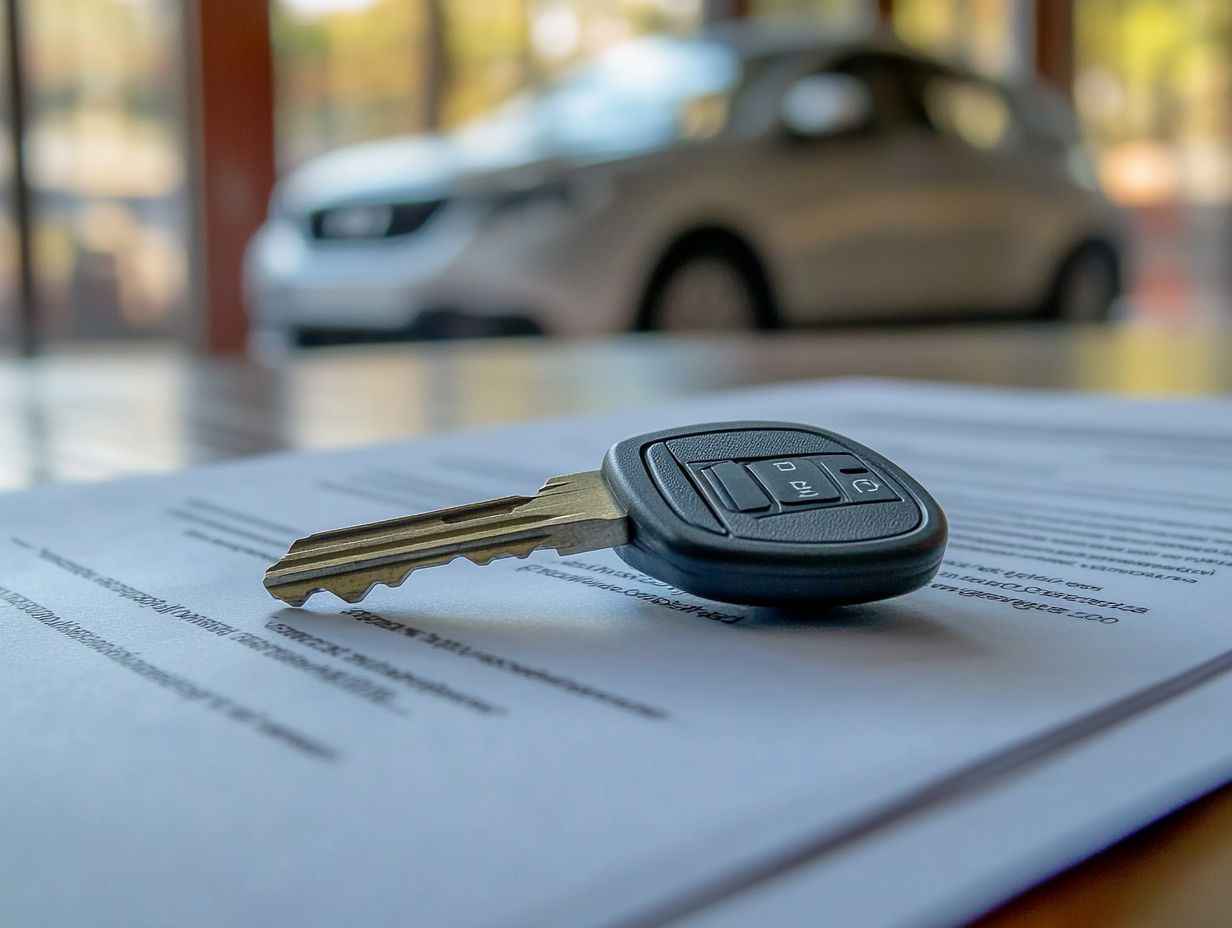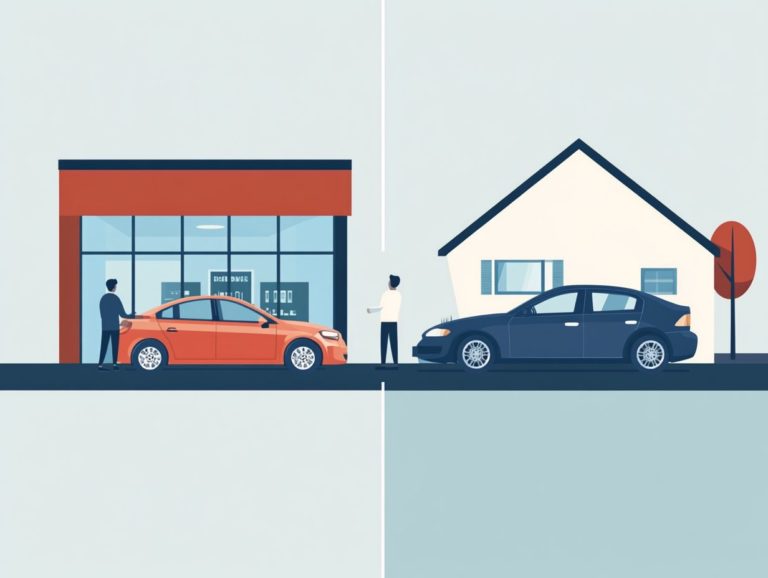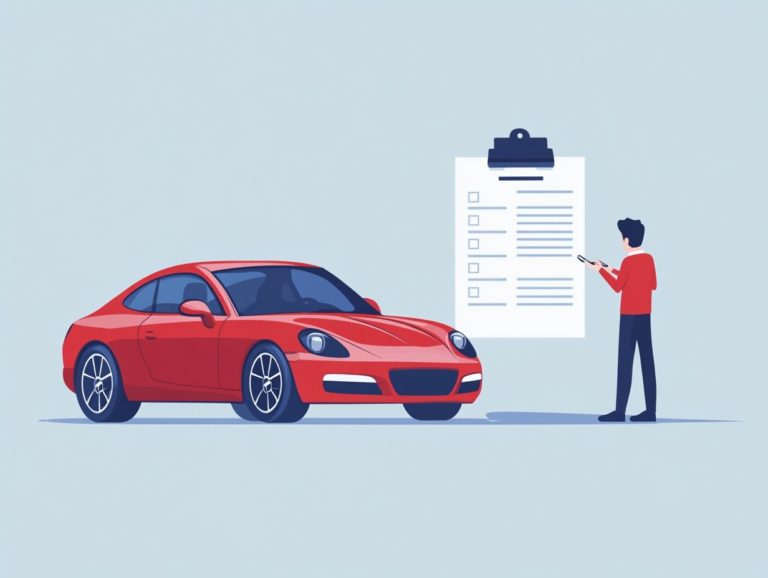What to Expect from a New Car Warranty
When you re in the market for a new car, understanding the warranty that accompanies it is essential to protect your money.
A new car warranty can provide peace of mind, but its complexities can feel overwhelming. Knowing your warranty can save you money and stress!
This article lays out everything you need to know, including the types of warranties available, their coverage, and the limitations you might face.
It covers standard and extended coverage periods and provides a guide for navigating the warranty claim process.
Prepare to equip yourself with the knowledge necessary to make informed decisions about your new vehicle.
Contents
Key Takeaways:

- A new car warranty covers specific repairs or replacements for a certain time.
- It s essential to understand the limitations and exclusions to avoid unexpected costs.
- Standard warranty periods typically range from 3 to 5 years, with extended warranty options available for additional coverage.
Understanding New Car Warranties
Understanding new car warranties is vital for vehicle owners who want to protect their investment. These warranties cover unexpected repair costs that can arise with normal use.
Whether you’re purchasing a new car, a certified pre-owned vehicle, or a hybrid, knowing the details of warranty terms can enhance your ownership experience especially in places like the EU and UK, where regulations may differ.
With the right knowledge, you can navigate various types of warranties, such as bumper-to-bumper and powertrain coverage. This ensures you are prepared for any maintenance repairs that might arise.
What is a New Car Warranty?
A new car warranty is a contract that promises to cover repairs within defined limits and time frames. This safeguards you against specific problems caused by the car maker and unforeseen issues.
This warranty typically includes factory warranties that protect vital components like the engine, transmission, and electrical systems. It also covers emissions warranties, which relate to pollution control systems.
Understanding the details of each type of coverage is essential. It clarifies which repairs are included and highlights any potential exclusions. Remember, not all wear-and-tear items, such as brake pads or tires, are included, which can lead to extra expenses.
By reviewing the warranty details thoroughly, you can navigate your options confidently, ensuring peace of mind during your vehicle ownership experience.
Types of Warranties Available
When considering vehicle coverage, you have several warranties to choose from:
- Manufacturer warranties typically come with your new car purchase, covering defects and malfunctions for a specific time or mileage.
- Extended warranties, often provided by third parties, offer protection beyond the original warranty period, giving you security against unexpected repair costs.
- Roadside assistance is a fantastic addition, providing services like towing, battery jumps, and tire changes to keep you safe on the road.
- If you’re leasing a vehicle, lease protection options can help reduce potential financial burdens from wear and tear, making your leasing experience smoother.
Coverage and Limitations
Understanding your new car warranty is crucial to protect yourself from unexpected repair costs during regular use. This knowledge becomes especially important when considering the warranty exclusions that may apply in certain situations.
It s all about ensuring you re fully protected and informed.
What is Covered by a New Car Warranty?

New car warranties typically offer broad protection that includes both powertrain protection the parts that generate power and deliver it to the wheels and bumper-to-bumper provisions, protecting you from unexpected problems.
These warranties bring peace of mind by covering essential components like the engine, transmission, and drivetrain, along with electrical systems, air conditioning, and even advanced safety features. With comprehensive coverage, you can significantly reduce out-of-pocket expenses when unexpected mechanical failures arise.
It s also important to know that repairs for the braking system, suspension, and fuel system are also covered. This coverage lets you enjoy your ride without worrying about surprise repair bills!
Limitations and Exclusions
While new car warranties provide substantial coverage, they often come with limitations and exclusions that can hinder your ability to claim necessary repairs. These may include deductible amounts and restrictions concerning aftermarket parts.
Such constraints can make you feel vulnerable, especially when unexpected repair costs crop up. For example, many warranties exclude coverage for damage resulting from modifications or inadequate routine maintenance, which could lead to out-of-pocket expenses for repairs you assumed were covered.
Deductible amounts can vary widely, affecting the total cost when you need to utilize warranty services. Additionally, some policies may impose limits on rental car coverage, leaving you without a vehicle during extended repair periods.
Therefore, it s essential to meticulously review your warranty documents. Pay close attention to these exclusions to ensure you understand your rights and limitations to prevent unwelcome surprises down the road.
Length of Coverage
The length of coverage offered by a new car warranty can significantly shape your ownership experience. Typically, standard warranty periods span from three to five years, but opting for extended warranty options can grant you added peace of mind that extends well beyond the initial terms.
Standard Warranty Periods
Standard warranty periods for new cars usually fall between three to five years, depending on the manufacturer and the specific coverage limits set forth in the warranty agreement.
For example, Ford typically offers a three-year/36,000-mile warranty, while Honda steps it up with a five-year/60,000-mile powertrain warranty, giving you that extra peace of mind. In contrast, BMW generally provides a four-year/50,000-mile warranty, which aligns with its luxury market positioning.
The duration and terms of these warranties can significantly shape your vehicle ownership experience, influencing your maintenance decisions and costs over time.
A comprehensive warranty often motivates owners to take exceptional care of their vehicles, as they enjoy protection against unexpected repairs throughout the coverage period.
Extended Warranty Options
Extended warranty options offer you an extra layer of peace of mind as a vehicle owner, allowing you to extend your coverage well beyond the standard warranty periods and cover more aspects of vehicle service.
These warranties can serve as a safeguard against unexpected repair costs, ensuring you re not caught off guard by those pricey fixes that can pop up as your vehicle ages. Before choosing, dive into the details of your coverage it s essential!
Keep in mind that vehicle identification is essential, as coverage can vary based on the make, model, and year of your car.
By diligently researching extended warranty providers, you can discover plans that align perfectly with your needs and active lifestyle, ensuring your vehicle continues to deliver reliability and performance for the long haul.
Explore your warranty options today and drive with confidence!
Making a Warranty Claim

Navigating a warranty claim may feel overwhelming, but understanding the warranty claim process can simplify your experience.
By knowing the necessary steps, you can secure coverage for your repair costs efficiently, allowing you to focus on what truly matters.
Steps to Follow
To navigate a warranty claim successfully, follow specific steps. Start with a thorough review of your warranty agreement and gather the necessary documentation to support your repair request.
These initial actions are crucial, as they set the stage for a smooth claims process. Examine your warranty conditions closely to understand what s covered and any potential limitations. Understanding the terms helps you determine your eligibility.
Next, compile essential documents such as receipts, warranty certificates, and records of any previous repairs or services. Organizing your documents boosts your chances of success!
With organized documentation, you’ll be ready to swiftly address any inquiries from the warranty provider.
What to Expect During the Process
Knowing what to expect during the warranty claim process can alleviate your concerns. This journey typically begins with communication with the service center regarding anticipated repair costs and timelines.
Your first step often involves filling out forms that detail the issue at hand, setting the stage for a detailed check. Once you submit your claim, the service center will examine the product to identify any repairs covered under the warranty. Be prepared for varying timelines, as they depend on the complexity of the required repairs.
Throughout this process, service representatives will keep you informed about the status of your claim, ensuring that necessary approvals from the manufacturer are obtained before proceeding with the repairs. With organized interactions and transparent updates, this process becomes much more manageable, allowing you to enjoy a smoother experience.
Frequently Asked Questions
What is a new car warranty?
A new car warranty is a guarantee provided by the manufacturer or dealer that covers certain repairs and maintenance for a specific period after purchasing a new car.
What does a new car warranty cover?

This can vary depending on the manufacturer, but most new car warranties cover the cost of repairs and replacement of any defective parts or components due to manufacturing defects. Some may also cover routine maintenance, such as oil changes and tire rotations.
How long does a new car warranty last?
The length of a new car warranty can vary, but most typically last for 3 to 5 years or a certain number of miles, whichever comes first. Some manufacturers may also offer extended warranties for an additional cost.
Is a new car warranty transferable?
It depends on the manufacturer’s policy. Some warranties are transferable to a new owner, while others are only valid for the original purchaser. Check with the manufacturer or dealer for specific details on transferability.
What is not covered under a new car warranty?
New car warranties typically do not cover regular wear and tear on parts, damage caused by accidents or improper use, or maintenance services that are not specified in the warranty. It’s important to read the fine print to understand what is and isn’t covered.
What happens if my new car needs repairs after the warranty expires?
If your car needs repairs after the warranty expires, you will be responsible for covering the cost. This is why it’s important to maintain your vehicle properly and consider purchasing an extended warranty for additional coverage.
If you have more questions, don t hesitate to reach out!






